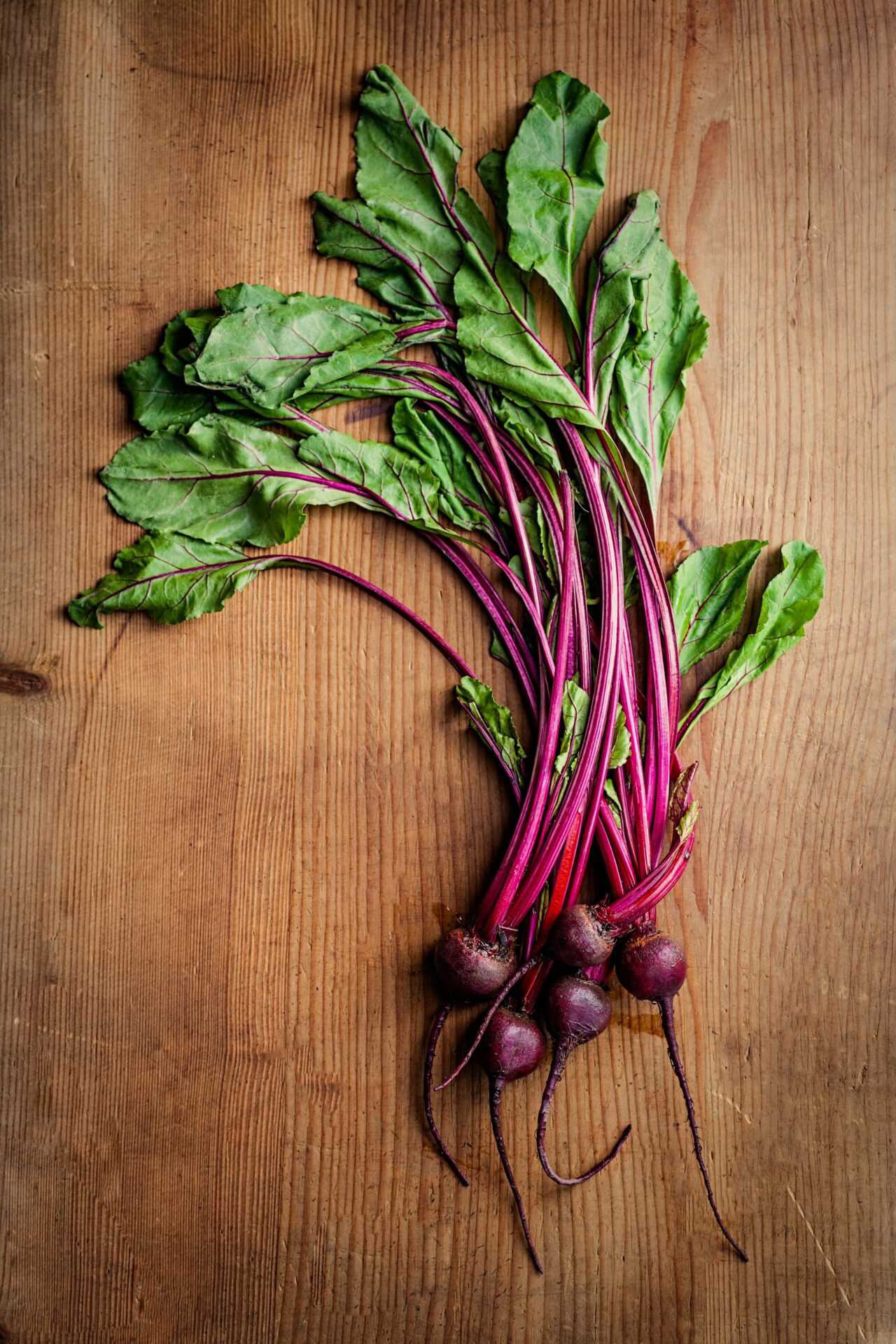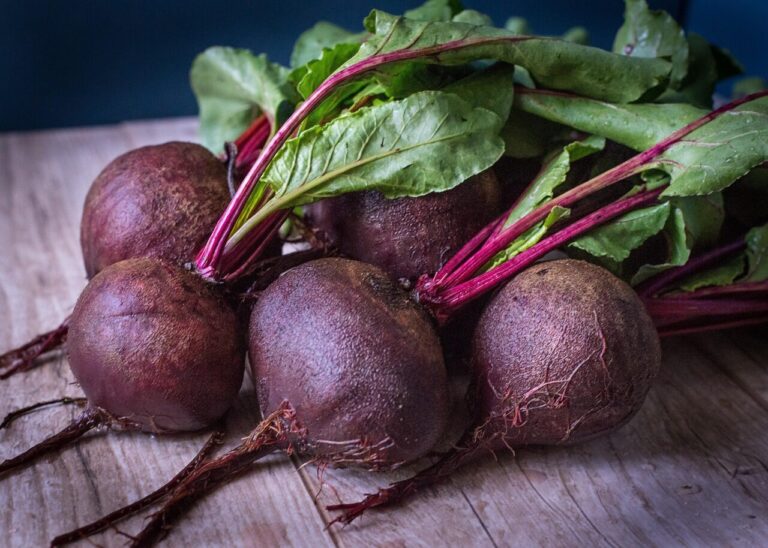
Introduction to Beetroot
Beetroot, scientifically known as Beta vulgaris, is a vibrant root vegetable that has garnered attention in recent years for its impressive health benefits and nutritional profile. This tuberous plant is rich in essential vitamins and minerals, particularly folate, manganese, potassium, iron, and vitamins A and C. The deep crimson color of beetroot is attributed to betalains, a group of potent antioxidants that exhibit anti-inflammatory and detoxifying properties. These nutrients contribute to beetroot’s reputation as a health superfood, making it a valuable addition to any diet.
Historically, beetroot has been consumed by human civilizations for centuries. Its origins can be traced back to ancient Mesopotamia, where both the leaves and the roots of the plant were utilized. The ancient Romans prized beetroot for its medicinal properties, often using it to treat various ailments such as fevers and digestive issues. As the years progressed, its culinary applications expanded, becoming a staple in various cultural dishes, from Eastern European borscht to salads and juices in contemporary cuisine.
In recent years, beetroot has gained immense popularity, especially among health enthusiasts and athletes. The increased interest in plant-based diets has further propelled beetroot into the spotlight, as more people seek natural ways to enhance their health and performance. Notably, beetroot juice has been studied extensively for its potential benefits in improving exercise performance and lowering blood pressure. Whether consumed raw, cooked, or juiced, beetroot continues to shine as a nutrient-dense food, inspiring countless recipes and dietary innovations around the globe.
Benefit 1: Improved Blood Pressure
Beetroot, a vibrant root vegetable, is increasingly recognized for its significant health benefits, particularly in relation to blood pressure regulation. The primary factor contributing to this advantage is the high concentration of nitrates found in beetroot. When consumed, these nitrates are converted into nitric oxide within the body. Nitric oxide plays a crucial role in vasodilation, the process by which blood vessels relax and widen, ultimately leading to improved circulation and reduced blood pressure levels.
Multiple studies underscore the relationship between beetroot consumption and blood pressure management. For instance, a systematic review published in the journal Hypertension highlighted that individuals who incorporated beetroot juice into their diets exhibited substantial reductions in both systolic and diastolic blood pressure. Such findings suggest that not only does beetroot support cardiovascular health through its nitrate content, but also provides a natural alternative for those looking to manage their blood pressure levels effectively.
In practical terms, incorporating beetroot into one’s diet can be both simple and enjoyable. Fresh beetroots can be roasted, boiled, or consumed raw in salads. For those who prefer convenience, beetroot juice is readily available and can be added to smoothies or consumed on its own. Furthermore, beetroot powder is a versatile option that can be integrated into various dishes, ranging from soups to baked goods. To maximize the health benefits associated with beetroot, it is advisable to consume it consistently as part of a balanced diet. This approach not only aids in blood pressure regulation but also enhances overall heart health, ensuring longevity and well-being.
Benefit 2: Enhanced Athletic Performance
Beetroot has gained significant attention in the sports and fitness community due to its remarkable health benefits, particularly regarding enhanced athletic performance. The rich content of nitrates found in beetroot is believed to be a key factor in improving endurance and stamina. Scientific research has shown that beetroot juice can facilitate better oxygen uptake during exercise, thereby allowing athletes to perform at higher intensities with less fatigue.
Studies indicate that consuming beetroot juice prior to workouts can lead to an increase in exercise efficiency. For instance, a report published in the Journal of Applied Physiology demonstrates that beetroot supplementation may reduce the oxygen cost during physical activities, enabling athletes to maintain their performance for longer periods. This implies that athletes can work harder and recover more quickly when they include beetroot in their diet.
Anecdotal evidence from professional athletes further supports the efficacy of beetroot as a performance enhancer. Many athletes have begun to incorporate beetroot juice into their training routines, reporting improved times in endurance events and feeling less drained after intense workouts. Notable athletes from various sports, including distance runners and cyclists, have endorsed beetroot as an essential part of their pre-competition preparation.
For optimal results, it is recommended that athletes consume beetroot juice approximately two to three hours before engaging in intensive exercises or competitions. This timeframe allows the nitrates sufficient time to convert into nitric oxide within the body, thus maximizing its effects during the workout. Incorporating beetroot in various forms, such as juice, smoothies, or even roasted in meals, can help athletes leverage its full potential to enhance stamina and performance.
Benefit 3: Reduced Inflammation
Beetroot is increasingly recognized for its powerful anti-inflammatory properties, primarily attributed to its rich content of betalains. Betalains are a group of pigments responsible for the vibrant red and purple hues of beetroots, and they have been shown to possess significant antioxidant and anti-inflammatory effects. Chronic inflammation is linked to various diseases, including heart disease, diabetes, and certain types of cancer. Therefore, incorporating beetroot into one’s diet may confer considerable health benefits by combating inflammation in the body.
Several studies have demonstrated the impact of beetroot consumption on inflammatory markers. For instance, research has indicated that regular intake of beetroot juice can lead to a noticeable reduction in inflammatory markers such as C-reactive protein (CRP) and interleukin-6 (IL-6). These reductions suggest that beetroot may play a protective role against diseases characterized by chronic inflammation. Additionally, the high levels of nitrates in beetroots contribute to improved blood flow and reduced oxidative stress, further enhancing their anti-inflammatory capabilities.
To maximize the anti-inflammatory benefits of beetroot, it is essential to consider preparation methods. Consuming raw beetroot, for instance, can help to retain its nutrients effectively. One popular way to enjoy raw beetroot is to blend it into smoothies or salads, where it can easily combine with other nutrient-rich ingredients. Roasting or steaming beetroots can also preserve their betalains while enhancing their natural sweetness. Pairing beetroot with ingredients rich in healthy fats, such as avocados or nuts, can support nutrient absorption and boost overall health.
Incorporating beetroot into daily meals can be simple and delicious, offering a natural way to combat inflammation while contributing to a balanced diet.
Published by May Healthy Lifestyle

